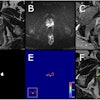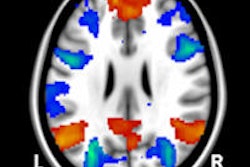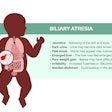Finnish researchers are using functional MRI (fMRI) to show how patients who have experienced one previous psychotic episode process information differently than healthy people.
Studies of psychosis often include chronically ill patients who tend to show more obvious differences in brain activity on fMRI. Early psychosis, on the other hand, can be more difficult to detect, according to the group led by Eva Rikandi, PhD, from Aalto University.
To provide the same brain stimuli to all subjects in the study, the participants were asked watched Tim Burton's "Alice in Wonderland." Using a 3-tesla MRI scanner, the researchers imaged the brains of 46 patients who had experienced only one psychotic event and 32 healthy controls, while the subjects watched the movie.
Functional MRI showed significant differences in the precuneus region of the brain, which is associated with memory, visuospatial awareness, self-awareness, and other aspects of consciousness, in the psychotic patients versus the controls.
Rikandi said the study achieved nearly 80% classification accuracy. The findings were presented at the annual European College of Neuropsychopharmacology (ECNP) conference in Amsterdam.



















